2017年12月大学英语四级作文参考范文——如何妥善处理医患关系
- 格式:docx
- 大小:24.41 KB
- 文档页数:2
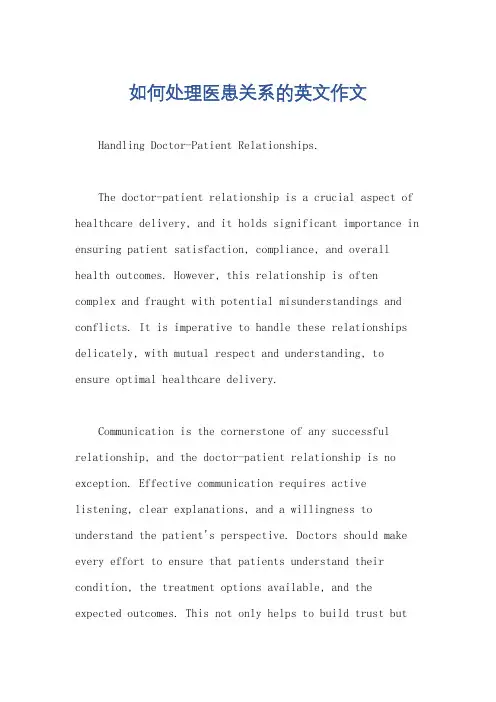
如何处理医患关系的英文作文Handling Doctor-Patient Relationships.The doctor-patient relationship is a crucial aspect of healthcare delivery, and it holds significant importance in ensuring patient satisfaction, compliance, and overall health outcomes. However, this relationship is often complex and fraught with potential misunderstandings and conflicts. It is imperative to handle these relationships delicately, with mutual respect and understanding, to ensure optimal healthcare delivery.Communication is the cornerstone of any successful relationship, and the doctor-patient relationship is no exception. Effective communication requires active listening, clear explanations, and a willingness to understand the patient's perspective. Doctors should make every effort to ensure that patients understand their condition, the treatment options available, and the expected outcomes. This not only helps to build trust butalso encourages patients to adhere to treatment plans and follow medical advice.Moreover, doctors should always maintain a professional demeanor, regardless of the circumstances. While it's understandable that doctors may encounter emotional situations, it's crucial to maintain composure and avoid taking personal affronts or reacting in ways that could escalate conflict. By maintaining a professional attitude, doctors can model appropriate behavior for patients andhelp to diffuse tense situations.Patients also play a crucial role in maintaininghealthy doctor-patient relationships. It's important for patients to be honest and forthcoming with their symptoms, medical history, and any changes in their condition. By providing accurate information, patients help doctors to make more informed decisions about their care. Additionally, patients should respect doctors' time and expertise, and adhere to recommended treatment plans.In addition to communication and mutual respect,another key aspect of handling doctor-patient relationships is the establishment of clear boundaries. Doctors should ensure that they maintain appropriate boundaries in terms of professional conduct, avoiding any behavior that could be interpreted as unethical or inappropriate. Similarly, patients should respect these boundaries and understandthat doctors are professionals who are bound by ethical and legal obligations.Another important consideration is the need for continuous education and training for doctors. The medical field is constantly evolving, and doctors need to stay updated with the latest research and best practices to ensure that they provide the best possible care to their patients. This also helps to build trust and confidence in the doctor-patient relationship, as patients can be assured that their doctors are knowledgeable and skilled in their field.Lastly, it's important to recognize that doctor-patient relationships are not static. They evolve over time, as patients' conditions change and as doctors and patients getto know each other better. It's crucial to be flexible and adaptive in these relationships, willing to adjust as necessary to ensure that the patient's needs are being met effectively.In conclusion, handling doctor-patient relationships requires a delicate balance of communication, mutual respect, clear boundaries, continuous education, and flexibility. By prioritizing these elements, doctors and patients can work together to build strong, healthy relationships that foster optimal healthcare delivery and positive health outcomes.。
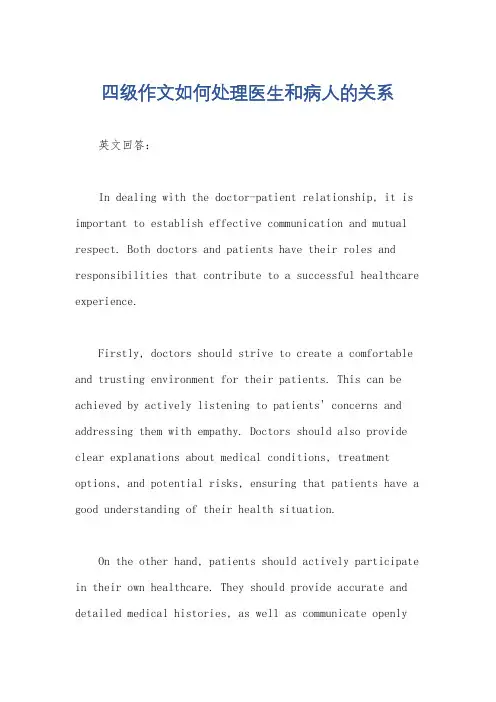
四级作文如何处理医生和病人的关系英文回答:In dealing with the doctor-patient relationship, it is important to establish effective communication and mutual respect. Both doctors and patients have their roles and responsibilities that contribute to a successful healthcare experience.Firstly, doctors should strive to create a comfortable and trusting environment for their patients. This can be achieved by actively listening to patients' concerns and addressing them with empathy. Doctors should also provide clear explanations about medical conditions, treatment options, and potential risks, ensuring that patients have a good understanding of their health situation.On the other hand, patients should actively participate in their own healthcare. They should provide accurate and detailed medical histories, as well as communicate openlyabout their symptoms and concerns. Patients should also follow the doctor's instructions and adhere to prescribed treatments, showing their commitment to their own well-being.Additionally, doctors should respect patients' autonomy and involve them in the decision-making process. This can be done by discussing treatment plans and involvingpatients in the decision-making process. Doctors should consider patients' preferences and values when making medical recommendations, ensuring that patients feel empowered and involved in their own healthcare journey.Furthermore, it is important for doctors to maintain professionalism and ethical conduct. They should treat every patient with dignity, regardless of their background or medical condition. Doctors should also maintain confidentiality and respect patients' privacy, creating a safe space for patients to share their concerns without fear of judgment or disclosure.In summary, the doctor-patient relationship should bebuilt on effective communication, mutual respect, and shared decision-making. Both doctors and patients have important roles to play in ensuring a successful healthcare experience. By fostering trust, empathy, and professionalism, doctors and patients can work together towards achieving optimal health outcomes.中文回答:和医生和病人的关系处理中,建立有效的沟通和相互尊重是非常重要的。
![[英语四级作文]2017年12月英语四级作文真题及范文(三篇)](https://uimg.taocdn.com/652a193b284ac850ac024282.webp)
2017年12月英语四级作文真题:师生关系 【题目】 Directions: For this part, you are allowed 30 minutes to write a short essay onhow to best handle the relationshop between teachers and students. You should write at least 120 words but no more than 180 words. 【参考范文一】 A good teacher-student relationship will make learning and teaching enjoyable and interesting. Both teachers and students should make efforts to build a harmonious relationship. On the one hand, the teacher plays an essential role in setting up a good teacher-student relationship. The teacher should motivate the students and lead them to be interested in learning. A good teacher should be patient, kindly and strict. Too kindly or too strict can be both harmful. On the other hand, the students should respect their teachers, and pay more attention in class to learn how to solve problems. It’s important to learn to raise questions and work out problems in new ways. A good teacher-student relationship benefits both the teachers and the students, so it’s vital for them to word harder. 【参考范文二】 Boundaries exist in virtually all human relationships, and students-teacher relationships are no exception to this rule. This reality gives rise to the following question: what kind of boundaries can be deemed appropriate in an academic setting ?My opinion is that, in general, a relatively formal distance should be kept between professors and their students. One reason to maintain a formal distance between students and teachers is to highlight the instructor’s role as an authority figure. This is important so that the professors can enforce discipline, have instructions followed, and command respect from students. Another reason why teachers should maintain a formal students with their students is to avoid real and perceived bias. If the teacher develops close relationships with the students, it may be difficult to completely eliminate bias. Even the impression of bias may cause some students to feel that they have been treated unfairly. In sum, maintaining a formal distance between teachers and students can ensure an atmosphere of authority in the classroom and avoid both real and perceived bias. 【参考译文】 几乎所有人类关系中都存在着界限,师生关系也不例外。
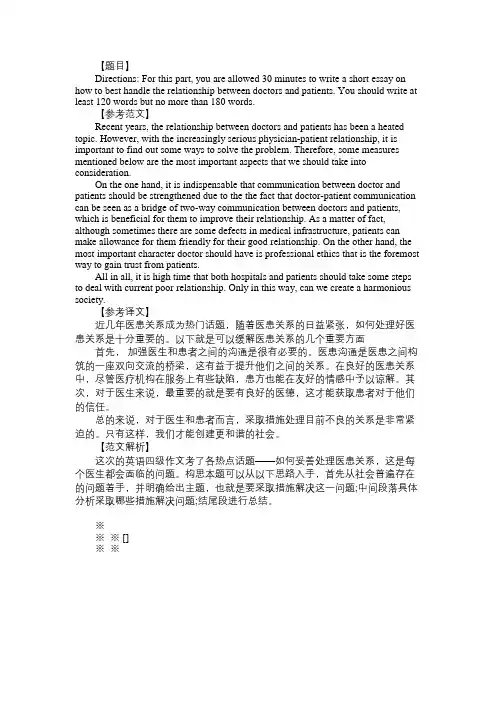
【题目】Directions: For this part, you are allowed 30 minutes to write a short essay on how to best handle the relationship between doctors and patients. You should write at least 120 words but no more than 180 words.【参考范文】Recent years, the relationship between doctors and patients has been a heated topic. However, with the increasingly serious physician-patient relationship, it is important to find out some ways to solve the problem. Therefore, some measures mentioned below are the most important aspects that we should take into consideration.On the one hand, it is indispensable that communication between doctor and patients should be strengthened due to the the fact that doctor-patient communication can be seen as a bridge of two-way communication between doctors and patients, which is beneficial for them to improve their relationship. As a matter of fact, although sometimes there are some defects in medical infrastructure, patients can make allowance for them friendly for their good relationship. On the other hand, the most important character doctor should have is professional ethics that is the foremost way to gain trust from patients.All in all, it is high time that both hospitals and patients should take some steps to deal with current poor relationship. Only in this way, can we create a harmonious society.【参考译文】近几年医患关系成为热门话题,随着医患关系的日益紧张,如何处理好医患关系是十分重要的。
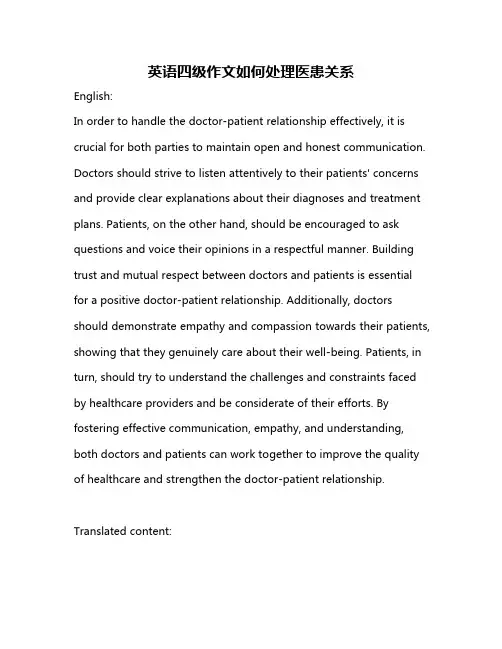
英语四级作文如何处理医患关系English:In order to handle the doctor-patient relationship effectively, it is crucial for both parties to maintain open and honest communication. Doctors should strive to listen attentively to their patients' concerns and provide clear explanations about their diagnoses and treatment plans. Patients, on the other hand, should be encouraged to ask questions and voice their opinions in a respectful manner. Building trust and mutual respect between doctors and patients is essential for a positive doctor-patient relationship. Additionally, doctors should demonstrate empathy and compassion towards their patients, showing that they genuinely care about their well-being. Patients, in turn, should try to understand the challenges and constraints faced by healthcare providers and be considerate of their efforts. By fostering effective communication, empathy, and understanding, both doctors and patients can work together to improve the quality of healthcare and strengthen the doctor-patient relationship.Translated content:为了有效处理医患关系,双方都必须保持开放和诚实的沟通。

英语四级作文如何处理医患关系In today's society, the doctor-patient relationship has become increasingly complex and delicate. With the advancement of medical technology and the rising expectations of patients, it is crucial to establish healthy and harmonious doctor-patient relationships. This article aims to explore effective ways to handle doctor-patient relationships, focusing on communication, trust, respect, and legal awareness.Firstly, effective communication is the foundation of any successful relationship, and the doctor-patient relationship is no exception. Doctors should take the initiative to communicate with their patients, explaining medical terms and procedures in layman's terms to ensure that the patient fully understands their condition and the proposed treatment plan. Patients, on the other hand, should also actively communicate their concerns and expectations, allowing doctors to provide more personalized and comprehensive care.Secondly, trust is essential in maintaining a stable doctor-patient relationship. Doctors should strive tomaintain a professional and ethical image, adhering to medical ethics and laws. They should respect the privacy of their patients and keep confidential information confidential. Patients, in turn, should trust their doctors and follow their advice, recognizing that doctors have extensive medical knowledge and expertise.Thirdly, respect is another crucial element in doctor-patient relationships. Doctors should respect the rights and dignity of their patients, treating them with courtesy and compassion. Patients, too, should respect the doctors' work and decisions, understanding that doctors are doing their best to provide the best possible care.Lastly, legal awareness is vital in handling doctor-patient relationships. Both doctors and patients should be aware of their rights and obligations under the law. Doctors should familiarize themselves with medical laws and regulations, ensuring that their practices comply withlegal requirements. Patients, on the other hand, should know their rights as patients and seek legal assistance if necessary.In conclusion, handling doctor-patient relationships requires effective communication, trust, respect, and legal awareness. By adhering to these principles, doctors and patients can establish harmonious relationships that promote better health outcomes and a more positive healthcare environment.**如何处理医患关系**在当今社会,医患关系变得越来越复杂和微妙。
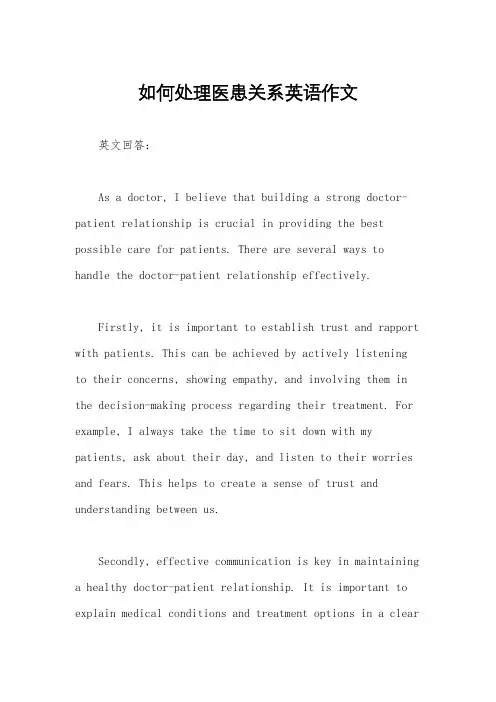
如何处理医患关系英语作文英文回答:As a doctor, I believe that building a strong doctor-patient relationship is crucial in providing the best possible care for patients. There are several ways to handle the doctor-patient relationship effectively.Firstly, it is important to establish trust and rapport with patients. This can be achieved by actively listening to their concerns, showing empathy, and involving them in the decision-making process regarding their treatment. For example, I always take the time to sit down with my patients, ask about their day, and listen to their worries and fears. This helps to create a sense of trust and understanding between us.Secondly, effective communication is key in maintaining a healthy doctor-patient relationship. It is important to explain medical conditions and treatment options in a clearand understandable manner. Using simple language and avoiding medical jargon can help patients feel more at ease and empowered in their own healthcare. For instance, I always make sure to explain any medical terminologies in a way that my patients can understand, and I encourage themto ask questions if they are unsure about anything.Furthermore, it is important to show respect and compassion towards patients. This can be demonstrated through simple gestures such as addressing patients bytheir preferred name, maintaining their privacy, and being mindful of their cultural and personal beliefs. For example, I always make an effort to address my patients by their preferred name and ensure that their privacy is respected during examinations and discussions.In addition, it is essential to be honest and transparent with patients. This includes admitting mistakes, discussing potential risks and uncertainties, and providing realistic expectations about their prognosis. Being openand honest fosters a sense of trust and understanding between doctors and patients. For instance, if a mistake ismade in a patient's treatment, I always take responsibility and explain the situation to the patient, and together we work on finding a solution.Finally, it is important for doctors to show empathy and understanding towards their patients' emotions and concerns. This can be achieved by acknowledging their fears and anxieties, offering emotional support, and being present during difficult times. For example, I always make sure to check in on my patients regularly, especially those who are going through a tough time, and offer a listening ear and words of encouragement.In conclusion, handling the doctor-patient relationship effectively involves building trust and rapport, effective communication, showing respect and compassion, being honest and transparent, and showing empathy and understanding. By following these principles, doctors can ensure that their patients feel valued, respected, and well-cared for.中文回答:作为一名医生,我认为建立良好的医患关系对于为患者提供最佳护理至关重要。
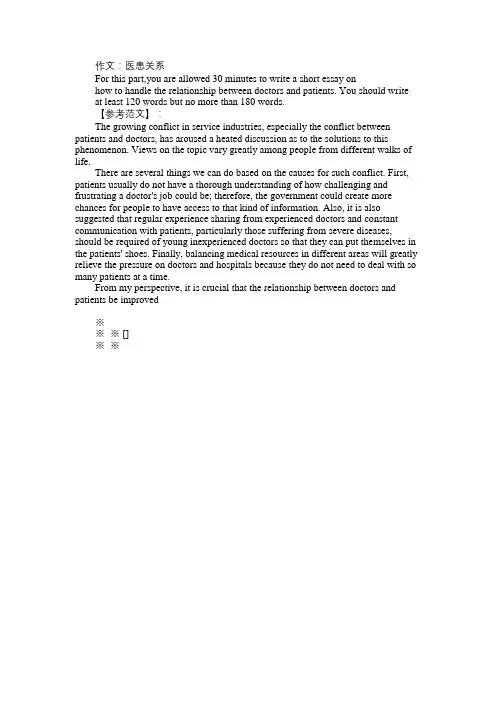
作文:医患关系For this part,you are allowed 30 minutes to write a short essay onhow to handle the relationship between doctors and patients. You should write at least 120 words but no more than 180 words.【参考范文】:The growing conflict in service industries, especially the conflict between patients and doctors, has aroused a heated discussion as to the solutions to this phenomenon. Views on the topic vary greatly among people from different walks of life.There are several things we can do based on the causes for such conflict. First, patients usually do not have a thorough understanding of how challenging and frustrating a doctor's job could be; therefore, the government could create more chances for people to have access to that kind of information. Also, it is also suggested that regular experience sharing from experienced doctors and constant communication with patients, particularly those suffering from severe diseases, should be required of young inexperienced doctors so that they can put themselves in the patients' shoes. Finally, balancing medical resources in different areas will greatly relieve the pressure on doctors and hospitals because they do not need to deal with so many patients at a time.From my perspective, it is crucial that the relationship between doctors and patients be improved※※※ []※※。
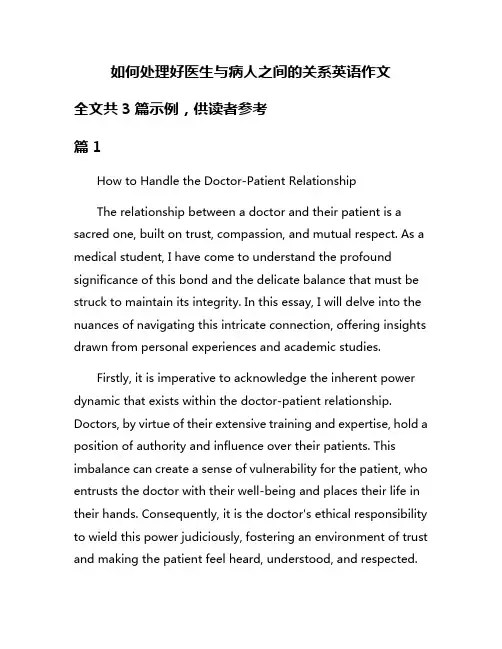
如何处理好医生与病人之间的关系英语作文全文共3篇示例,供读者参考篇1How to Handle the Doctor-Patient RelationshipThe relationship between a doctor and their patient is a sacred one, built on trust, compassion, and mutual respect. As a medical student, I have come to understand the profound significance of this bond and the delicate balance that must be struck to maintain its integrity. In this essay, I will delve into the nuances of navigating this intricate connection, offering insights drawn from personal experiences and academic studies.Firstly, it is imperative to acknowledge the inherent power dynamic that exists within the doctor-patient relationship. Doctors, by virtue of their extensive training and expertise, hold a position of authority and influence over their patients. This imbalance can create a sense of vulnerability for the patient, who entrusts the doctor with their well-being and places their life in their hands. Consequently, it is the doctor's ethical responsibility to wield this power judiciously, fostering an environment of trust and making the patient feel heard, understood, and respected.Effective communication is the cornerstone of any successful doctor-patient relationship. Doctors must cultivate active listening skills, allowing patients to express their concerns, symptoms, and fears without interruption. By demonstrating empathy and validating the patient's emotions, doctors can establish a rapport that transcends the clinical setting. Clear and comprehensible explanations of medical jargon, treatment plans, and potential risks are essential, empowering patients to make informed decisions about their healthcare.Privacy and confidentiality are paramount in maintaining the sanctity of the doctor-patient relationship. Patients must feel secure in the knowledge that their personal information, medical history, and intimate details will be treated with the utmost discretion. Breaching this trust can have severe consequences, eroding the foundation of the relationship and undermining the patient's willingness to divulge sensitive information crucial for accurate diagnosis and effective treatment.Cultural competence and sensitivity are indispensable qualities for doctors navigating the diverse tapestry of patients they encounter. Respecting cultural beliefs, traditions, and preferences can foster a deeper connection and enhance the patient's comfort level. By acknowledging and accommodatingcultural nuances, doctors can tailor their approach, ensuring that their care is inclusive and resonates with the patient's values and lived experiences.Professionalism and ethical conduct are non-negotiable in the medical field. Doctors must maintain objectivity, avoiding personal biases or judgments that could compromise their ability to provide impartial care. Adhering to strict ethical guidelines, such as respecting patient autonomy and maintaining appropriate boundaries, is essential for preserving the integrity of the doctor-patient relationship.Furthermore, continuity of care plays a vital role in strengthening this bond. When patients have the opportunity to establish long-term relationships with their doctors, a deeper level of understanding and trust can develop. Consistent care enables doctors to monitor the patient's progress, adjust treatment plans as needed, and foster a sense of familiarity and comfort for the patient.While the doctor-patient relationship is primarily focused on the well-being of the patient, it is crucial to acknowledge the emotional toll that medical professionals often face. Dealing篇2The doctor-patient relationship is a delicate and complex dynamic that requires careful navigation from both parties. As a medical student, I have come to understand the importance of cultivating a strong rapport with patients, built on trust, empathy, and effective communication. This essay will explore various strategies for fostering positive doctor-patient relationships, drawing from personal experiences and insights gained during my clinical rotations.Firstly, it is crucial to approach each patient interaction with an open mind and a willingness to listen. Patients often come to their appointments with a myriad of concerns, fears, and preconceptions about their health condition. As a doctor, it is our responsibility to create a safe and non-judgmental environment where patients feel comfortable expressing themselves freely. Active listening is key – paying close attention to not only the patient's words but also their body language, tone, and underlying emotions. This helps us better understand their unique perspective and tailor our approach accordingly.Empathy is another cornerstone of a successfuldoctor-patient relationship. We must strive to view the situation through the patient's eyes, acknowledging their struggles, validating their feelings, and showing genuine compassion.Simple gestures, such as maintaining eye contact, offering a comforting touch (with consent), and using reassuring language, can go a long way in making patients feel heard and supported. It is important to remember that patients are not just a collection of symptoms but whole individuals with complex lives and experiences.Clear and effective communication is also essential in building trust and fostering a collaborative partnership with patients. As medical professionals, we must be mindful of using plain language that is easily understandable, avoiding jargon or overly technical terms whenever possible. Encouraging patients to ask questions and providing thorough explanations about their condition, treatment options, and potential risks or side effects can help alleviate anxiety and empower them to make informed decisions about their care.Furthermore, it is crucial to respect patient autonomy and involve them in the decision-making process. While we possess the medical expertise, patients have the right to make choices about their own bodies and have their personal values and preferences taken into account. Presenting all viable options objectively, without coercion or bias, and engaging in shareddecision-making can strengthen the doctor-patient bond and improve treatment adherence.Cultural competence and sensitivity are also important considerations in building successful doctor-patient relationships. We must be aware of and respect different cultural beliefs, practices, and communication styles that may influence a patient's perception of health and illness. Taking the time to understand a patient's cultural background and adapting our approach accordingly can help bridge potential gaps and foster better understanding and trust.Maintaining professionalism and setting appropriate boundaries is another key aspect of managing thedoctor-patient relationship. While empathy and rapport are essential, it is important to maintain a certain level of detachment and objectivity to ensure that our clinical judgment is not compromised. Setting clear boundaries and expectations from the outset, such as addressing privacy concerns, respecting personal space, and avoiding inappropriate personal disclosures, can help maintain a healthy and ethical dynamic.Lastly, continuity of care and follow-up are crucial for building long-term, meaningful relationships with patients. Consistently seeing the same provider or team of providers canfoster a sense of familiarity and trust, allowing for more efficient communication and a deeper understanding of the patient's unique needs. Regular follow-up appointments and check-ins, whether in-person or through telemedicine, can reinforce the doctor-patient bond and ensure that patients feel supported throughout their healthcare journey.In conclusion, cultivating positive doctor-patient relationships is a multifaceted endeavor that requires a combination of active listening, empathy, clear communication, respect for patient autonomy, cultural sensitivity, professionalism, and continuity of care. By consistently applying these principles, we can create an environment of trust, understanding, and collaboration, ultimately leading to better health outcomes and a more fulfilling experience for both patients and healthcare providers. As future physicians, it is our responsibility to continuously strive for excellence in this realm, recognizing the profound impact that strong doctor-patient relationships can have on the healing process and overall quality of care.篇3How to Handle the Doctor-Patient RelationshipThe relationship between a doctor and their patient is a delicate and complex dynamic that requires care, empathy, and professionalism from both parties. As future medical professionals, it is crucial for us to understand the nuances of this relationship and develop strategies to navigate it effectively. In this essay, I will explore the key elements of a healthydoctor-patient relationship and provide insights on how we, as students, can cultivate and maintain positive interactions with our future patients.The first and foremost aspect of a successful doctor-patient relationship is trust. Patients entrust their well-being, and sometimes their lives, to the expertise and care of their doctors. It is our responsibility to foster an environment of trust by demonstrating competence, integrity, and respect. We must actively listen to our patients, acknowledge their concerns, and provide clear, honest communication throughout the treatment process. By establishing trust, patients are more likely to feel comfortable sharing sensitive information, adhering to treatment plans, and engaging in open dialogue about their health.Effective communication is the cornerstone of a strong doctor-patient relationship. As medical students, we mustdevelop exceptional communication skills to ensure that our patients fully understand their conditions, treatment options, and the potential risks and benefits associated with each choice. Clear and comprehensible language, free from excessive medical jargon, is essential to facilitate understanding and foster a collaborative decision-making process. Additionally, we should encourage our patients to ask questions, voice their concerns, and actively participate in their own care.Empathy is another crucial element in building a positive doctor-patient relationship. We must strive to understand our patients' perspectives, emotions, and life circumstances, as these factors can significantly impact their health and well-being. By demonstrating empathy, we can establish a deeper connection with our patients, which can lead to improved treatment adherence, better health outcomes, and a more satisfying overall experience for both parties.Cultural competence is also an essential aspect of a successful doctor-patient relationship. We must be aware of and sensitive to the diverse cultural backgrounds, beliefs, and values of our patients. By respecting and accommodating cultural differences, we can build trust, enhance communication, and provide more culturally appropriate care. This approach not onlyimproves the quality of care but also promotes inclusivity and fosters a more equitable healthcare system.Maintaining professional boundaries is crucial in the doctor-patient relationship. While empathy and rapport are essential, it is important to maintain a professional distance to ensure objectivity and avoid potential conflicts of interest. We must be mindful of the power dynamics inherent in thedoctor-patient relationship and refrain from engaging in inappropriate or unethical behaviors that could compromise our professional integrity or the well-being of our patients.Confidentiality is another key aspect of the doctor-patient relationship. Patients must feel confident that their personal health information will be treated with the utmost privacy and discretion. As future medical professionals, we must uphold strict confidentiality standards and ensure that patient data is securely maintained and shared only with authorized individuals involved in their care.Finally, it is important to recognize the emotional toll that caring for patients can have on healthcare professionals. We must prioritize our own mental and physical well-being to avoid burnout and maintain the ability to provide compassionate and competent care. Seeking support from colleagues, mentors, orprofessional counseling services when needed can help us navigate the emotional challenges of our profession and maintain a healthy work-life balance.In conclusion, the doctor-patient relationship is a multifaceted dynamic that requires careful cultivation and maintenance. By fostering trust, effective communication, empathy, cultural competence, professional boundaries, confidentiality, and self-care, we can create an environment that promotes better health outcomes, patient satisfaction, and a more fulfilling professional experience for ourselves as future medical practitioners. It is our responsibility to uphold these principles and continuously strive to improve the quality of our interactions with patients, ensuring that we provide the highest standard of care while maintaining the utmost respect and compassion for those we serve.。
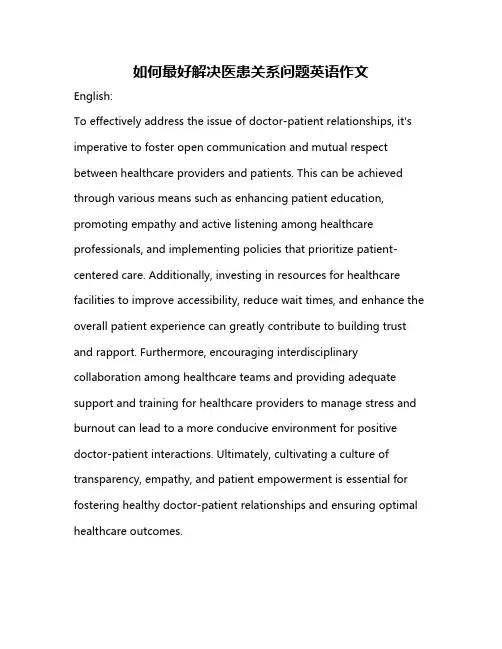
如何最好解决医患关系问题英语作文English:To effectively address the issue of doctor-patient relationships, it's imperative to foster open communication and mutual respect between healthcare providers and patients. This can be achieved through various means such as enhancing patient education, promoting empathy and active listening among healthcare professionals, and implementing policies that prioritize patient-centered care. Additionally, investing in resources for healthcare facilities to improve accessibility, reduce wait times, and enhance the overall patient experience can greatly contribute to building trust and rapport. Furthermore, encouraging interdisciplinary collaboration among healthcare teams and providing adequate support and training for healthcare providers to manage stress and burnout can lead to a more conducive environment for positive doctor-patient interactions. Ultimately, cultivating a culture of transparency, empathy, and patient empowerment is essential for fostering healthy doctor-patient relationships and ensuring optimal healthcare outcomes.中文翻译:为了有效解决医患关系问题,必须在医疗提供者和患者之间培养开放的沟通和相互尊重。
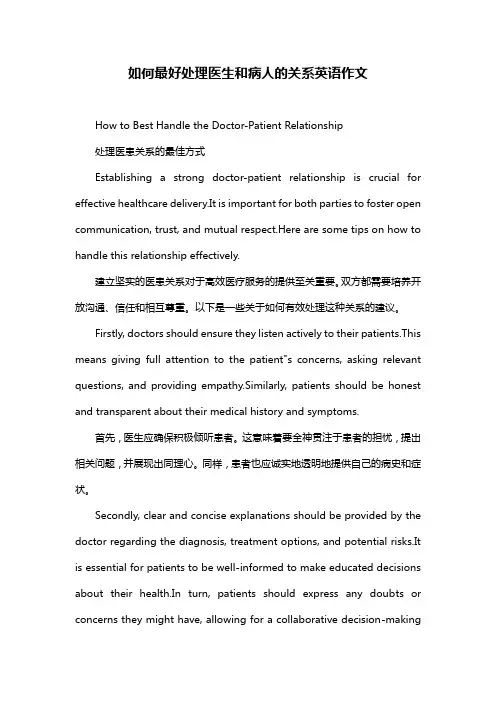
如何最好处理医生和病人的关系英语作文How to Best Handle the Doctor-Patient Relationship处理医患关系的最佳方式Establishing a strong doctor-patient relationship is crucial for effective healthcare delivery.It is important for both parties to foster open communication, trust, and mutual respect.Here are some tips on how to handle this relationship effectively.建立坚实的医患关系对于高效医疗服务的提供至关重要。
双方都需要培养开放沟通、信任和相互尊重。
以下是一些关于如何有效处理这种关系的建议。
Firstly, doctors should ensure they listen actively to their patients.This means giving full attention to the patient"s concerns, asking relevant questions, and providing empathy.Similarly, patients should be honest and transparent about their medical history and symptoms.首先,医生应确保积极倾听患者。
这意味着要全神贯注于患者的担忧,提出相关问题,并展现出同理心。
同样,患者也应诚实地透明地提供自己的病史和症状。
Secondly, clear and concise explanations should be provided by the doctor regarding the diagnosis, treatment options, and potential risks.It is essential for patients to be well-informed to make educated decisions about their health.In turn, patients should express any doubts or concerns they might have, allowing for a collaborative decision-makingprocess.其次,医生需要就诊断、治疗方案和潜在风险向患者提供清晰、简洁的解释。
How to Handle Doctor-Patient Relationships In today's healthcare environment, doctor-patient relationships are crucial for effective treatment and positive patient outcomes. However, these relationships can often be complex and challenging, especially when communication breakdowns, misunderstandings, and trust issues arise. To ensure optimal care and patient satisfaction, it's essential to approach doctor-patient relationships with compassion, respect, and transparency. **Communication is Key**Effective communication is the foundation of any successful doctor-patient relationship. Physicians must take the time to listen actively and empathize with their patients, understanding their concerns, fears, and expectations. Patients often feel more comfortable sharing their symptoms, medical history, and lifestyle habits when they feel heard and respected. It's also crucial for doctors to provide clear, concise information about diagnoses, treatment options, and expected outcomes. This helps patients feel informed and involved in their care plan.**Empathy and Compassion**Doctors must demonstrate empathy and compassion towards their patients, recognizing that each individual is unique and may be experiencing significant emotional distress. By acknowledging patients' feelings and offering support, doctors can establish a sense of trust and cooperation that is essential for effective treatment. Additionally, doctors should strive to provide a non-judgmental environment where patients feel safe disclosing sensitive information.**Transparency and Education**Transparency is another crucial aspect of doctor-patient relationships. Physicians should provide patients with detailed information about their condition, including the risks and benefits of different treatment options. They should also explain the potential side effects and outcomes of treatment, allowing patients to make informed decisions about their care. Additionally, doctors should educate patients about their condition and its management, empowering them to take an active role in their own healthcare.**Respect for Patient Autonomy**Respecting patient autonomy is essential in maintaining healthy doctor-patient relationships. Patients have theright to make decisions about their own healthcare, and doctors should respect these decisions even if they differ from their own recommendations. By involving patients inthe decision-making process and explaining the reasons for their recommendations, doctors can foster trust and cooperation while also ensuring that patients feelrespected and informed.**Conclusion**In summary, handling doctor-patient relationships effectively requires a commitment to communication, empathy, compassion, transparency, and respect for patient autonomy. By fostering these values, doctors can create positive, supportive environments that promote optimal patient outcomes and satisfaction. By prioritizing patient-centered care, doctors can build lasting relationships with their patients, enhancing the overall quality of healthcare delivery.**如何处理医患关系**在当今的医疗环境中,医患关系对于有效治疗和患者积极康复至关重要。
如何处理医生和病人之间的关系英语作文全文共3篇示例,供读者参考篇1How to Handle the Relationship Between Doctors and PatientsThe doctor-patient relationship is a crucial aspect of healthcare delivery. It is essential for patients to trust their healthcare providers and for doctors to have open communication with their patients. Here are some tips on how to handle the relationship between doctors and patients effectively:1. Establish Trust: Trust is the foundation of thedoctor-patient relationship. Doctors should be honest, compassionate, and respectful towards their patients. Patients need to feel comfortable sharing their concerns and medical history with their doctors. Building trust takes time, but it is essential for a successful doctor-patient relationship.2. Communicate Effectively: Effective communication is key to a good doctor-patient relationship. Doctors should listen carefully to their patients, ask relevant questions, and explain medical information in a clear and understandable way. Patientsshould feel comfortable asking questions and expressing their concerns to their doctors.3. Respect Patient’s Autonomy: Patients have the right to make decisions about their own healthcare. Doctors should respect their patient's autonomy and involve them in the decision-making process. Patients should be informed about their treatment options and have the opportunity to voice their preferences and concerns.4. Be Empathetic: Empathy is an essential quality for healthcare providers. Doctors should show empathy towards their patients and understand their emotions and concerns. Patients appreciate healthcare providers who show kindness and compassion during difficult times.5. Maintain Professional Boundaries: It is essential for doctors to maintain professional boundaries with their patients. Doctors should avoid sharing personal information with their patients and ensure that interactions remain professional at all times. Patients should also respect the professional boundaries of their healthcare providers.6. Follow Up: Follow-up care is critical for many medical conditions. Doctors should schedule follow-up appointments and communicate with their patients about their progress.Patients should also follow their doctor's instructions and attend all scheduled appointments.7. Address Concerns: Patients may have concerns or complaints about their healthcare experiences. Doctors should address these concerns promptly and take steps to resolve any issues. Patients should feel comfortable speaking up if they are dissatisfied with their care.In conclusion, the doctor-patient relationship is a vital component of healthcare delivery. By establishing trust, communicating effectively, respecting patient autonomy, showing empathy, maintaining professional boundaries, following up on care, and addressing concerns, doctors and patients can build a strong and positive relationship. This relationship is essential for providing quality healthcare and improving patient outcomes.篇2Building a strong and positive relationship between doctors and patients is crucial for effective healthcare. The relationship between a doctor and a patient is based on trust, respect, communication, and understanding. Here are some tips on howto handle the relationship between doctors and patients effectively:Firstly, communication is key. Doctors should strive to communicate with their patients in a clear andeasy-to-understand manner. Patients need to feel that their doctor is listening to them, understanding their concerns, and explaining their medical condition in a way that is easy to grasp. Effective communication can help to build trust and strengthen the doctor-patient relationship.Secondly, mutual respect is essential. Doctors should treat their patients with respect, dignity, and empathy. Patients should also show respect towards their doctors by following their advice, being honest about their medical history, and cooperating with their treatment plan.Thirdly, trust is the foundation of the doctor-patient relationship. Patients need to trust that their doctor has their best interests at heart and is providing them with the best possible care. Doctors need to earn their patients' trust by being honest, transparent, and competent in their medical practice.Fourthly, empathy and understanding are important qualities for both doctors and patients. Doctors should try to understand their patients' feelings, fears, and concerns, andshow empathy towards their suffering. Patients should also try to understand the pressures and challenges that doctors face in their daily practice.Fifthly, patient education is essential. Doctors should take the time to educate their patients about their medical condition, treatment options, and lifestyle changes that can help improve their health. Patients should also take responsibility for their own health by learning about their condition and actively participating in their treatment plan.Lastly, feedback and follow-up are important aspects of the doctor-patient relationship. Patients should feel comfortable giving feedback to their doctors about their care and treatment. Doctors should also follow up with their patients to monitor their progress, address any concerns, and make adjustments to their treatment plan as needed.In conclusion, a strong and positive relationship between doctors and patients is essential for providing quality healthcare. By focusing on communication, respect, trust, empathy, patient education, feedback, and follow-up, both doctors and patients can work together to achieve better health outcomes. Building a strong doctor-patient relationship requires effort and commitment from both parties, but the benefits are well worth it.篇3How to Handle the Relationship Between Doctors and PatientsThe relationship between doctors and patients is a crucial aspect of healthcare delivery. It is essential for both parties to maintain a positive and respectful relationship in order to ensure effective treatment and care. However, achieving this can sometimes be challenging, as doctors and patients may have different perspectives and expectations. In this article, we will discuss some strategies for handling the relationship between doctors and patients.First and foremost, it is important for doctors to communicate effectively with their patients. This involves listening to their concerns, explaining medical conditions and treatment options clearly, and addressing any questions or doubts that the patient may have. By engaging in open and honest communication, doctors can build trust with their patients and create a supportive environment for collaboration.Patients, on the other hand, can also play a crucial role in building a positive relationship with their doctors. It is important for patients to be honest about their symptoms, medical history,and lifestyle habits. This information is essential for doctors to make an accurate diagnosis and develop an appropriate treatment plan. Patients should also ask questions and seek clarification if they are unsure about any aspect of their care.Respect is another key element in the doctor-patient relationship. Doctors should treat their patients with dignity and respect, regardless of their background or medical condition. Patients, in turn, should show respect for their doctors by following their recommendations, attending appointments on time, and adhering to their treatment plans.Empathy is also essential in fostering a positive relationship between doctors and patients. Doctors should strive to understand their patients' emotions and experiences, and respond with compassion and sensitivity. Patients, too, should try to see the doctor as a human being who is working to help them, rather than just a medical professional.In addition, it is important for doctors to involve patients in decision-making regarding their care. This can help patients feel empowered and engaged in their treatment, leading to better outcomes. Doctors should explain the risks and benefits of different treatment options, and work together with patients to develop a plan that aligns with their goals and values.Finally, continuity of care is important for maintaining a strong doctor-patient relationship. Patients should try to see the same doctor regularly, as this can help build trust and familiarity over time. Doctors, in turn, should strive to provide consistent and personalized care to their patients, taking into account their individual needs and preferences.In conclusion, the relationship between doctors and patients is a vital component of healthcare delivery. By fostering open communication, mutual respect, empathy, shareddecision-making, and continuity of care, doctors and patients can work together to achieve the best possible outcomes. By following these strategies, both doctors and patients can contribute to a positive and supportive healthcare experience.。
2017 年12 月大学英语四级考试真题答案与详解(第 3 套)Part I Writing审题思路:近年来关于医患关系问题的讨论非常热烈,学生对这一话题并不陌生。
对于如何处理好医患关系(h ow to best handle the relationship between doctors and patients)可以从宏观角度进行讨论,如政府应该如何做;也可以从微观角度入手,即医生和患者应该怎么做,从而进一步转化成人与人之间的相处之道,如理解、信任等,再结合医患关系讨论即可。
这样处理,相对前者要简单许多。
当然,考生可以根据自己的认知和英语水平等实际情况,使自己的文章最大可能地出彩。
高分范文:Mutual Understanding Is Most ImportantWhen we talk about the relationship between doctors and patients, what comes into my mind is generally negative news. However, I believe there is a way for doctors and patients to get along harmoniously—that is mutual understanding.s attitude or response is On the one hand, patients are helpless and worried when they go to hospital. So doctor’critically important for them and their family. On the other hand, doctors have to face so many patients every day that theyeven have no time to take a rest. Such a high intensity of work could drive a man crazy. Thus, if they can stand in eachbrief conclusion about the condition of patients might shoes, most problems could be solved. Otherwise, a doctor’sother’sbe regarded as cold blood and result in conflicts.Nowadays, much effort has been made to ease the tension of doctor-patient relationship. But I think the most effective one is mutual understanding and trust.全文翻译:相互理解最重要当我们谈论医患关系时,进入我脑海的多是负面新闻。
如何最好地处理医患关系四级英语作文English:Establishing and maintaining a strong doctor-patient relationship is crucial in providing quality healthcare. Firstly, effective communication is key. Doctors should actively listen to patients' concerns, explain medical information in understandable terms, and encourage questions. Patients, on the other hand, should openly express their symptoms, concerns, and expectations. Secondly, mutual respect and empathy are essential. Doctors must treat patients with dignity, respect their autonomy, and acknowledge their emotions. Similarly, patients should respect doctors' expertise and follow their recommendations. Thirdly, fostering trust is vital. Doctors should be honest, transparent, and accountable in their interactions with patients, addressing any errors or uncertainties promptly. Patients, in turn, should trust their doctors' expertise and judgment. Additionally, continuity of care enhances the doctor-patient relationship. Consistency in seeing the same doctor allows for better understanding of medical history, preferences, and individual needs. Finally, cultural competence is indispensable. Doctors should be sensitive to patients' cultural backgrounds, beliefs, and practices,adapting their approach accordingly to ensure effective communication and mutual understanding. In conclusion, a harmonious doctor-patient relationship is built on effective communication, mutual respect, trust, continuity of care, and cultural competence, ultimately leading to improved healthcare outcomes.Translated content:建立和维护良好的医患关系对于提供优质医疗至关重要。
英语四级作文如何处理医患关系英文回答:The Deteriorating Doctor-Patient Relationship: Causes and Solutions.The doctor-patient relationship has been a cornerstoneof healthcare for centuries. However, in recent years, this relationship has been strained, leading to mistrust, dissatisfaction, and even medical errors. Understanding the causes of this deterioration is crucial to findingsolutions that can restore the bond between patients and healthcare providers.The rise of consumerism in healthcare is a major factor contributing to the erosion of the doctor-patient relationship. Patients now view themselves as consumers of medical services, rather than as partners in their own care. This shift has led to a demand for more convenience, choice, and control, which can strain the traditional doctor-patient dynamic.Additionally, the increasing complexity of medical science has made it more difficult for patients to understand their own health issues. This lack of understanding can lead to mistrust, as patients may feel that their doctors are not adequately explaining their conditions or treatment options.Moreover, the increasing use of technology in healthcare can create a barrier between patients and their doctors. Patients may feel that they are not receiving enough face-to-face time with their healthcare providers, which can erode trust and rapport.To address the deteriorating doctor-patient relationship, several solutions must be implemented. First, healthcare providers need to make a conscious effort to build strong relationships with their patients. This can be done by spending more time with patients, listening totheir concerns, and explaining medical information in a clear and understandable way.Second, healthcare professionals need to be more transparent about the limitations of medical science. Patients need to understand that not all diseases can be cured, and that treatment options may have risks and side effects. This transparency can help build trust andrealistic expectations.Third, healthcare providers need to embrace technologyin a way that enhances the patient experience. Technology can be used to improve communication, provide patients with access to their medical records, and even facilitatevirtual consultations.Finally, patients also have a responsibility to contribute to the doctor-patient relationship. They need to be actively involved in their own care, by asking questions, expressing their concerns, and following their doctor's advice. Patients should also recognize the limitations of medical science and be realistic about the outcomes oftheir treatment.By working together, healthcare providers and patients can restore the doctor-patient relationship and build a healthcare system that is based on trust, respect, and shared decision-making.中文回答:医患关系恶化,原因与解决办法。
如何处理医患关系英语作文Title: Managing Doctor-Patient Relationships。
Doctor-patient relationships are paramount in ensuring effective healthcare delivery and patient satisfaction. Building and maintaining positive relationships between doctors and patients require mutual respect, effective communication, empathy, and trust. In this essay, we will explore strategies for handling doctor-patientrelationships to ensure optimal outcomes for both parties involved.Firstly, effective communication is the cornerstone ofa healthy doctor-patient relationship. Doctors should actively listen to patients' concerns, empathize with their feelings, and clearly communicate medical information in a language that patients can understand. Utilizing plain language instead of medical jargon can bridge the gap in comprehension and foster trust between doctors and patients. Moreover, doctors should encourage patients to askquestions and actively involve them in shared decision-making regarding their treatment plans.Secondly, empathy plays a crucial role in buildingtrust and rapport between doctors and patients. Patients often seek medical care not only for physical ailments but also for emotional support. Empathetic doctors who demonstrate understanding and compassion towards patients' feelings can alleviate anxiety and enhance the overall patient experience. Empathy enables doctors to connect with patients on a deeper level, fostering a sense of trust and partnership in the healthcare journey.Furthermore, respecting patients' autonomy and dignity is essential for maintaining a positive doctor-patient relationship. Doctors should recognize and honor patients' rights to make informed decisions about their healthcare, including treatment options, risks, and benefits. Respecting patients' choices and preferences instills a sense of empowerment and fosters mutual respect between doctors and patients. Additionally, maintaining patient confidentiality and privacy reinforces trust andconfidentiality in the doctor-patient relationship.In addition to communication, empathy, and respect, managing expectations is vital in doctor-patient relationships. Patients may have unrealistic expectations about their treatment outcomes, recovery timelines, or the efficacy of medical interventions. Doctors should provide realistic explanations about the prognosis, potential complications, and limitations of treatment to manage patients' expectations effectively. Open and honest communication about treatment goals and anticipated outcomes can prevent misunderstandings and prevent disappointment or dissatisfaction.Moreover, addressing cultural and social factors is essential for effective doctor-patient relationships, particularly in diverse or multicultural settings. Doctors should be culturally competent and sensitive to patients' beliefs, values, and cultural practices. Understanding cultural nuances can help doctors tailor their approach to care, ensuring that it aligns with patients' cultural preferences and beliefs. By acknowledging and respectingcultural diversity, doctors can strengthen trust and enhance the quality of care provided to patients from different backgrounds.In conclusion, fostering positive doctor-patient relationships requires a multifaceted approach encompassing effective communication, empathy, respect for autonomy, managing expectations, and cultural competence. By prioritizing these elements, doctors can establish trust, promote patient engagement, and improve health outcomes. Ultimately, nurturing strong doctor-patient relationships is not only integral to providing quality healthcare but also enhances patient satisfaction and overall well-being.。
2017年12月大学英语四级作文参考范文——如何妥善处理医患关系
来源:文都教育
2017年12月大学英语四级考试如期举行,今年四级考试有一则作文题目是如何妥善处理医患关系,文都教育提供参考范文一篇如下:
【题目】
Directions: For this part, you are allowed 30 minutes to write a short essay on how to best handle the relationship between doctors and patients. You should write at least 120 words but no more than 180 words.
【参考范文】
Recent years, the relationship between doctors and patients has been a heated topic. However, with the increasingly serious physician-patient relationship, it is important to find out some ways to solve the problem. Therefore, some measures mentioned below are the most important aspects that we should take into consideration.
On the one hand, it is indispensable that communication between doctor and patients should be strengthened due to the the fact that doctor-patient communication can be seen as a bridge of two-way communication between doctors and patients, which is beneficial for them to improve their relationship. As a matter of fact, although sometimes there are some defects in medical infrastructure, patients can make allowance for them friendly for their good relationship. On the other hand, the most important character doctor should have is professional ethics that is the foremost way to gain trust from patients.
All in all, it is high time that both hospitals and patients should take some steps to deal with current poor relationship. Only in this way, can we create a harmonious society.
【参考译文】
近几年医患关系成为热门话题,随着医患关系的日益紧张,如何处理好医患关系是十分重要的。
以下就是可以缓解医患关系的几个重要方面
首先,加强医生和患者之间的沟通是很有必要的。
医患沟通是医患之间构筑的一座双向交流的桥梁,这有益于提升他们之间的关系。
在良好的医患关系中,尽管医疗机构在服务上有些缺陷,患方也能在友好的情感中予以谅解。
其次,对于医生来说,最重要的就是要有良好的医德,这才能获取患者对于他们的信任。
总的来说,对于医生和患者而言,采取措施处理目前不良的关系是非常紧迫的。
只有这样,我们才能创建更和谐的社会。
【范文解析】
这次的英语四级作文考了各热点话题——如何妥善处理医患关系,这是每个医生都会面临的问题。
构思本题可以从以下思路入手,首先从社会普遍存在的问题着手,并明确给出主题,也就是要采取措施解决这一问题;中间段落具体分析采取哪些措施解决问题;结尾段进行总结。